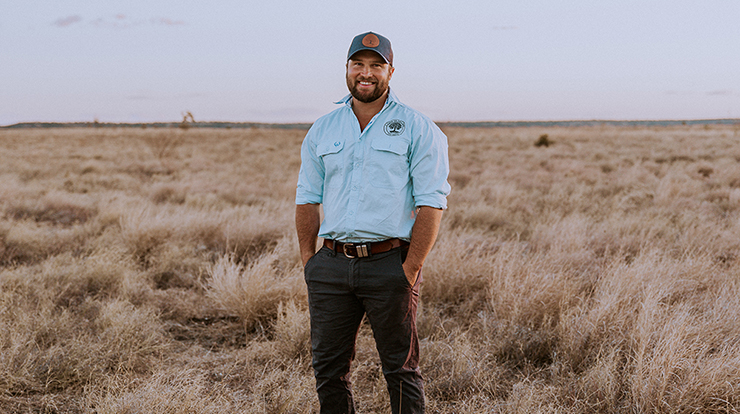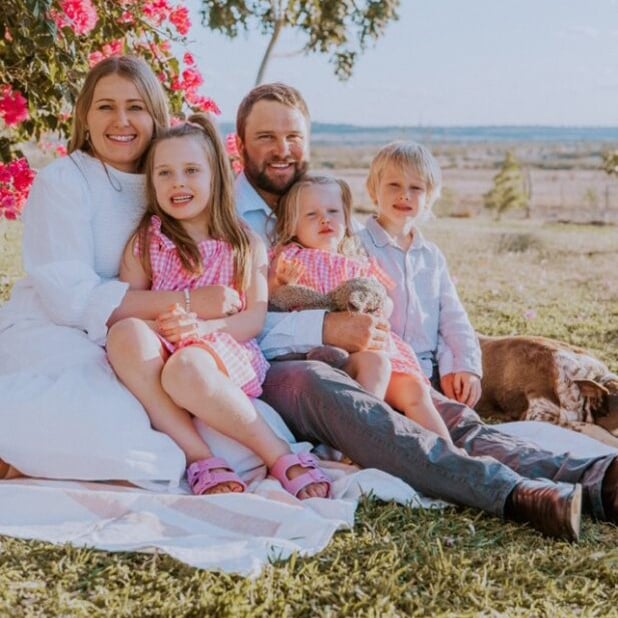Sam’s road to resilience
17 April 2024
 Sam Fryer. Image: Zoe Thomas Photography
Sam Fryer. Image: Zoe Thomas Photography
Key points:
- You’re not alone in facing challenges.
- Small changes can have a significant, positive impact.
- There’s practical support available for producers.
Sam Fryer wears many hats: devoted husband and father, regional area manager for Queensland Rural and Industry Development Authority (QRIDA), beef producer and mental health advocate.
After listening to his earnest conversation on the Humans of Agriculture podcast, it’s clear why the host Oli Le Lievre described Sam as ‘someone you wish was your best mate’.
Sam shared the personal strategies he’s developed to overcome the series of profound life challenges he’s faced.
His decision to reach out to his family and ask for help was the first step towards building resilience, and he hopes to encourage others, particularly those living and working in rural Australia, to also take that step.
Bouncing back Sam’s ability to bounce back repeatedly from the slew of successive life traumas he’s faced is testament to his grit, resilience and the close relationship he shares with his family.
Having the self-awareness to recognise when it was time to ask for help, coupled with the tenacity to maintain his ongoing wellbeing, have been key to his resilience.
When he was just 10, Sam lost his beloved younger sister and best friend, Alex, due to complications with her cerebral palsy.
At 17, he almost lost an arm in a motorbike accident – an experience which shook his youthful sense of infallibility to the core.
The lament of loss continued to feature in his adult life as he dealt with the grief of losing members of his community to suicide.
Mental health support is key Sam acknowledged the missed opportunity to access mental health support as he struggled as a young person at boarding school.
“I needed to see someone and talk to someone, but at that time no one taught us about mental health – it was all about physical fitness and eating right. It was a massive hole,” Sam said.
Years later, Sam’s realisation that he required this support saw him reach out to his parents and begin the healing process.
“Mum and Dad noticed I was different. I just broke down and cried for hours in the kitchen. It was too much. I’d had enough. They just said, ‘well why don’t you see someone?’ The hardest thing anyone can do is admit there’s a problem and then do something about it,” Sam said.
Sam went on to see a mental health specialist in Townsville who explained how everyone has a cup which can only take so much stress until it overflows.
“It took me a few sessions of seeing her and I started making a bit of a turnaround. It took me about three years to get it right – getting my routine right.
I stopped drinking alcohol during the week and now I’ll just have a couple on the weekend. I know what triggers me.
“I’m a work in progress – every day I work on it. I do yoga and meditate five times a week. I’m forever reading stories about people who have overcome things in life,” Sam said.
A team approach
These days, Sam and his wife Emily strive to balance the need to provide for their young children, Bella, Charlie and Lucy, while also prioritising family time.
“A few years ago, we recognised something had to give after we were struggling to juggle the demands of parenting with us both working on and off the farm. We had to drop some stuff – it’s hard to find work–life balance but ultimately, you have to put family first.
“We’ve made some radical changes. At the moment, Emily is full time at home with the kids. It’s a sacrifice but we have a team approach and try to be flexible,” Sam said.
Switching off
Sam keeps himself on-track by implementing regular self-care activities into his daily routine.
“Doing something not related to your business helps – I need alone time to have a run or walk with the dogs. You need to reset – put your phone down. You might like reading or going to the footy. It needs to be more than sitting around and drinking,” Sam said.
Ensuring he gets eight hours of sleep a night and switching from watching TV to reading a book before going to bed, have been worthwhile changes.
Sam and Emily’s involvement in various clubs in town has kept them connected to their local community and provided diversion from focusing solely on on-farm issues.
Practical help
In Sam’s professional role as QRIDA regional area manager for the North West and Gulf, he provides practical help for producers feeling the impact of natural disasters and prolonged seasonal challenges.
“We’re the first point of call for grants and disaster relief. When producers need financial assistance to help recover from disaster or find ways to improve the productivity and profitability of their enterprise, we’re here to help walk them through the application process and answer any questions they may have.
“We do a lot of drought preparedness work and discuss how water infrastructure and fencing can help them manage their country better,” Sam said.
QRIDA’s grants and loans help producers fund practical drought strategies, such as building feed sheds or adding water infrastructure.
“Splitting up country according to its land type is also effective. We discuss strategies such as fencing off riverbeds to prevent erosion and allow grass to grow.
“Some country has sweet spots and the cattle always hammer that after rain – but if you fence it off and move water to different parts of the property using pipe bores, you can make use of the available water and control where it goes,” Sam said.
“A Drought Preparedness Grant can be really effective for producers because it takes the financial burden off funding these sustainable practices themselves.”
Other tips include fencing off dams to prevent stock getting bogged and accessing artesian water. He said in terms of decision making around drought, being prepared and informed are key. Proactively accessing the available support will put producers in a better position to deal with whatever eventuates over the coming year.



